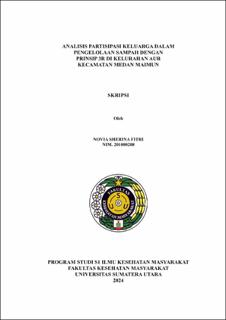| dc.description.abstract | Waste is still a problem in the Medan City environment, as evidenced by the waste generation
reaching 1,722 tons/day with a composition of organic and inorganic waste. Aur Village, which
is located in Medan Maimun District, is a densely populated settlement with very minimal
waste management, this shows that there are still people who throw rubbish into the river.
Interventions have been carried out by the government and NGOs in handling waste, but
community participation is still minimal. This research aims to analyze family participation in
waste management using the 3R principles. The type of research used was a descriptive survey
and was located in Kampung Aur, Medan Maimun District. The research period is August 2023
to February 2024. The population is 773 families and the sample is 88 respondents. Purposive
sampling technique with people living in the Deli watershed. Data collection was carried out
using a questionnaire instrument to measure 3R participation in waste management and
observation sheets to assess supporting factors in the form of transportation services and waste
bins. The research results showed that 70.5% of housewives were elderly, 58.0% had a low
level of education, 55.7% did not work and 58.0% had a family income >UMK in Medan City.
From these results, supporting factors were found, namely the head of the environment
monitoring waste banks, regular outreach and coaching on waste management. NGOs support
the provision of waste bank facilities and waste transportation. 58.0% of people are not
registered with transportation services and 57.0% of people do not have trash facilities. The
results of waste management using the 3R principles found poor participation of 51.1%.
Suggestions for environmental heads to collaborate with the Environmental Service to motivate
people to become members of the transportation service and facilitate rubbish bins. So that
people are able to improve waste management using the principles of Reuse and Recycle | en_US |


